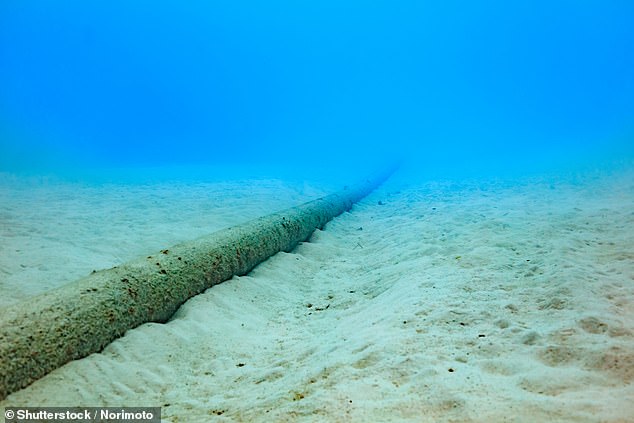Australia risks an internet and communications blackout if it fails to embrace the opportunity of becoming one of the world’s major data centre hubs at the forefront of the AI revolution, a former ADF Brigadier turned academic has warned.
Professor Ian Langford said Australia relies on just 15 undersea cables for 99 per cent of its international data traffic for things like banking, markets, emergency services, defence communications and even streaming Netflix.
But a malicious foreign actor, such as China, could easily cripple this crucial infrastructure, plunging the country into digital darkness and wiping billions from the ASX in the process.
To counter this threat, Professor Langford, who served in the ADF for over 30 years, has called on the government and tech leaders to build AI data centres to bolster Australia’s sovereignty and resilience by offering a back-up option.
‘With the PLA (China’s People’s Liberation Army) cutting some military undersea cabling in Taiwan this year it forces us to think how vulnerable are we in terms of the same threat vector, and I think the answer is highly vulnerable,’ Prof Langford said.
‘We need to onshore a lot of our critical data and therefore we need to build sovereign data centres here so that we have the ability to effectively have a redundancy in the event of some sort of disruption to our critical infrastructure.’
‘But also from a regional perspective to house data from south-west Pacific nations and other countries in the southern hemisphere which would allow this part of the world to survive in the event of a massive disruption which could occur should conflict break out between the US and China over Taiwan, for example.’
Prof Langford explained that a data centre was ‘essentially a hothouse that converts energy into intelligence, into information’.

Professor Ian Langford said Australia relies on just 15 undersea cables for 99 per cent of its international data traffic for things like banking, markets, emergency services, defence communications and even Netflix streaming

About 99 per cent of internet traffic flows through just 15 undersea cables
‘Energy goes in and information comes out,’ he said.
‘And so you need power, you need access to infrastructure as in the site where you’re situated, you need security, you need people and it needs to be cost sensitive.’
Australia is perfectly poised to provide all of these things, with Treasurer Jim Chalmers recently boasting that Australia is among the top five global destinations for data centres.
But many technology firms within the field have complained about red tape preventing them from building data centres on Australian soil.
Dan Roberts, a former Macquarie banker who co-founded Bitcoin mining and data centre-building firm IREN back in 2018, has said he would ‘love’ to build them in Australia but that it is ‘just not practical’.
He compared Australia’s position now with AI to the one it faced during the resources boom of the early 2000s, where instead of building up its own manufacturing industry, Australia simply shipped its commodities overseas.
‘We’re in the same position now, where the fourth industrial revolution is essentially energy as your input and a digital good as your output,’ Mr Roberts told Capital Brief.
‘Given the abundance of land, wind, solar, etcetera, we’ve got the same opportunity now, but all this red tape that gets in the way of actually doing it.’
His comments come a week after Atlassian co-founder Scott Farquhar called for Australia to harness the AI revolution by becoming a world leader in data centres.

Australia is perfectly poised to provide all of the requirements to become a global hub for data centres, with Treasurer Jim Chalmers recently boasting that Australia is among the top five global destinations for data centres

But many technology firms within the field have complained about the volume of red tape preventing them from building them on Australian soil
The rich-lister claimed data centres could allow to ‘export megawatts as megabytes (and get paid megabucks)’.
‘This is a multi-billion-dollar, multi-decade opportunity,’ Mr Farquhar told the National Press Club.
Prof Langford argues that this is borne out in the figures: at the moment, data centres account for 1.5 per cent of global energy production.
But by 2030, that figure is predicted to rise to 13 per cent, with most of the energy used to cool the computer chips processing the data.
Prof Langford said that Australia was at a crossroads.
‘If Australia wants to be a leader in all forms of emerging technology, such as AI, quantum computing and others, then we need to build critical infrastructure here to have sovereignty over those opportunities,’ he added.
‘And if we don’t do it, we’re going to be left behind. It’s as simple as that.’









